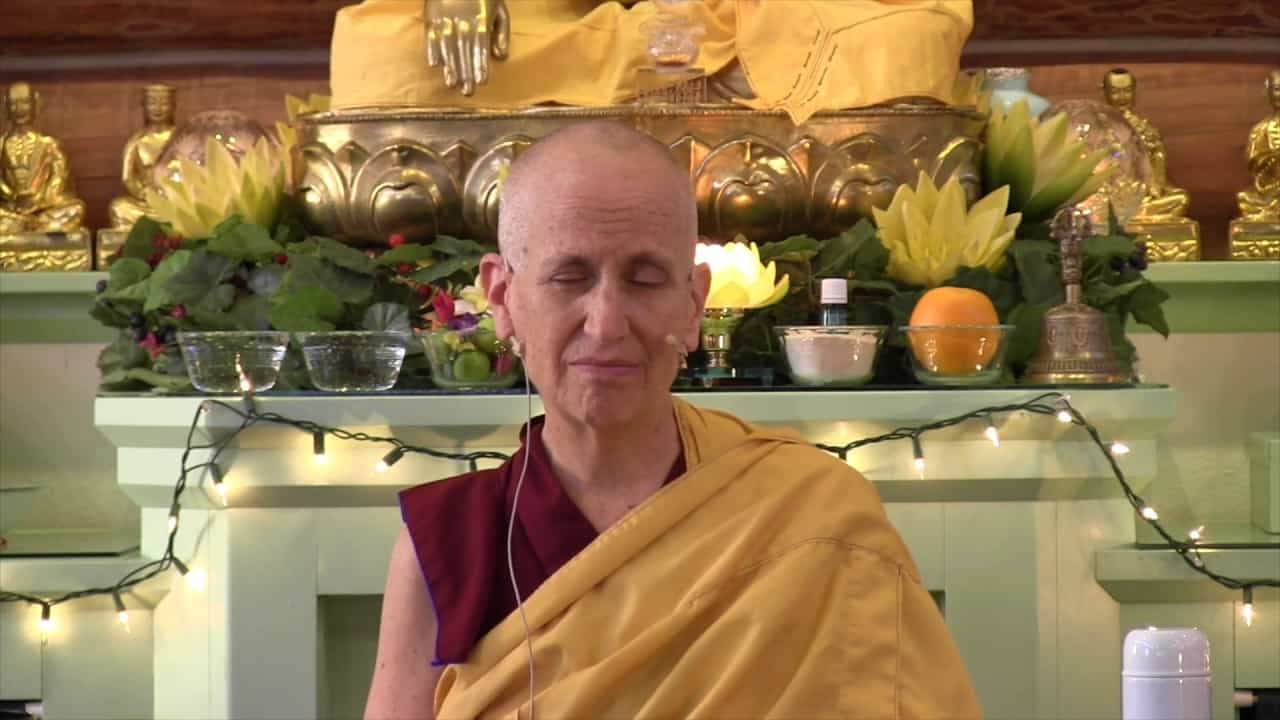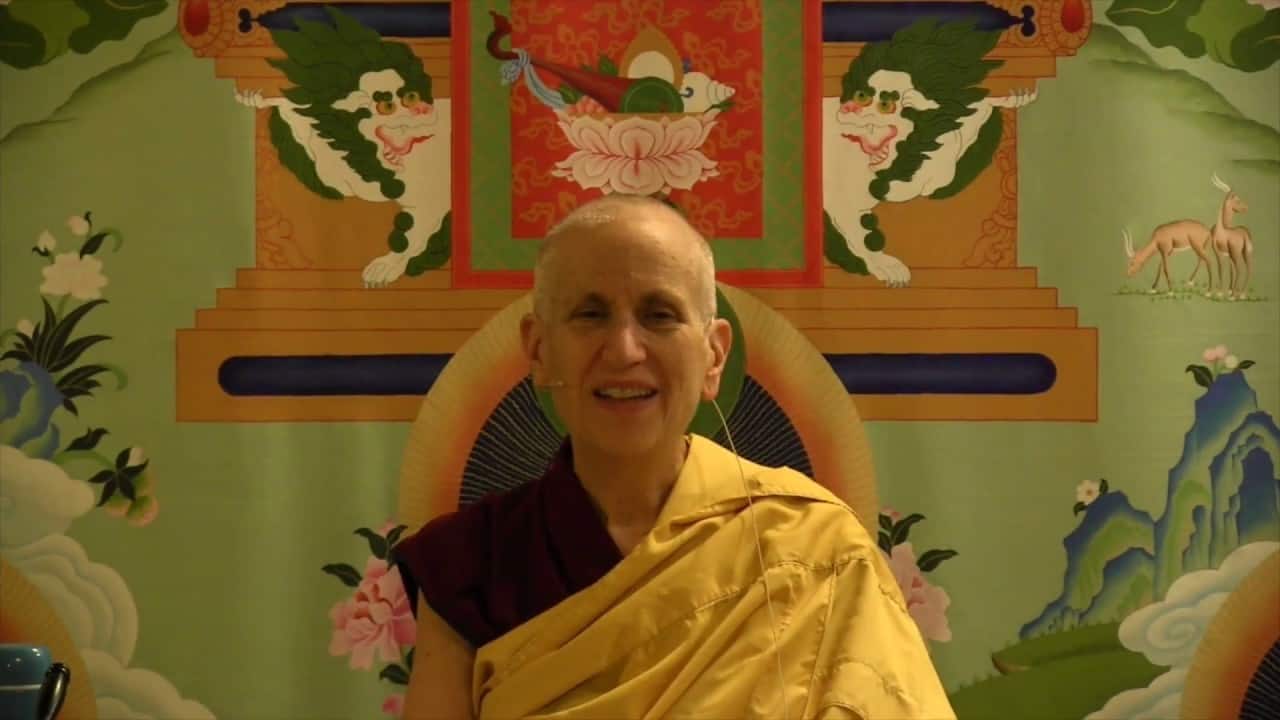Overcoming attachment to identities
Venerable Chodron discusses a Dharma practitioner's insight about attachment to identities for a Bodhisattva's Breakfast Corner talk.
I wanted to share with you a letter I received from one of the inmates that I’ve been corresponding with for some time. He is in Joliet, Illinois at Stateville Correctional Center. I believe he’s in for life, but he’s trying to appeal and get the sentence changed. In any case, he is a very, very thoughtful person. We have really very good exchanges in our letters. It’s not chitchat. He was telling me about an “aha” moment that he had.
I don’t know if everybody’s aware, but Chicago has a very high murder rate; over 750 people were murdered last year. And the murder rate has gone way, way up. He was from Chicago. His whole family is there. He says, “In the aftermath of the uptick of violence and crime in Chicago, my mom and son are packing up and moving to Texas. My sister and her kids have already moved there. I have an aunt and uncle who moved from Chicago to Nevada last month. My dad lives in Indiana, but he’ll be moving to Texas, too. Bottom line: all of my family is about to be gone from Chicago.” This is where he was born and raised and everything.
He told me, “What dawned on me was just how attached I was to the idea of being a Chicago guy. My identity was so hardwired to the fact that Chicago was home that when I’d imagine I was on a beach in Fiji, the landscape in my vision was really a beach I used to frequent in Chicago. Or I’d be imagining that I was in Paris, but the vision would really just be downtown Chicago with the Eiffel Tower in the backdrop. But now that I’ll no longer have family in Chicago, the spell of that place being home is broken, and I realize how much of my creative energy was being siphoned off into maintaining that identity.”
That’s spot on, isn’t it, about how much of our creative energy is being siphoned off to maintain an identity? In his case, it was the identity of being a Chicago guy. It may be any other identity. It could be my identity as a member of a certain family, my identity as a member of a certain career, of a certain socio-economic class, of a certain nation, of a certain sexual orientation, of a certain religion. We could have bazillions of identities that we’re not really aware that we have. I don’t think he was particularly aware of clinging so strongly to being a Chicago guy until all of a sudden he wasn’t.
So, it’s important to really look at some of the identities we have; again, it could be racial, ethnic—who knows what. But his point is that he saw how much of his energy was being siphoned off, was flowing away by trying to maintain that identity. And in his case, it wasn’t even that he was trying to consciously maintain it. It was just what he said: it was hardwired into him. So, I think that’s interesting sometimes to try and notice what identities we hold on to like that.
But let me continue the letter. He said, “So then, on a deeper level, I realized how much energy was being siphoned off by my attachment to the location of my family being the place that I called home.” The first one was just being a Chicago guy. The second is that the identity of where his family lives must be his home. I always kind of marvel when I hear the Abbey monastics say, “I’m going to go home to visit.” I find that kind of strange because this is home. We are “left home” people. We are “left home” people; we don’t have a home. The monastery is our home. But, here again, how much of his energy was being siphoned off by thinking, “Home is where my family is. I belong at home. I am rooted at home.” It’s that identity to a place, to a family, to whatever it is.
“My attachment to them,” that’s what he said. “Just my attachment” to all these things. “I can love my family without being attached to the conditioning I’ve received from them.” This is big! This guy doesn’t even call himself a Buddhist either. So, this is to realize I can love certain people without being attached to the conditioning that they’ve given me. And in our families, we’ve received so much conditioning—about politics, about what we’re supposed to think of different kinds of people, how we’re supposed to act in different kinds of situations. So much prejudice has been inculcated into us through our family; there are so many “shoulds” and “shouldn’ts” and “ought to” and “supposed to.”
So often we’re just not even aware that these are conditioned elements. We think that these are real, that these are who we are. In society today, people are always trying to find out who they are. And I think that’s one of the reasons for many people returning to a more fundamentalist view of their own religion, because it gives them a sense of identity: “I know what the world is. I know how I’m supposed to behave. I know who other people are.”
I was surprised growing up reformed Jewish when I heard of other people who grew up like me and then started keeping kosher and then even maybe became like the Hasidics. And I thought, “Wow, that’s a huge change. Why in the world would they do that?” I think it’s a search for identity, for security, for stability—in the same way that so many people go to fundamentalist Christianity. It gives you an identity, a security. Or like we’re so full of identity politics now.
You know who you are, who your group is, and this is really emphasized as important in the world. So much of our energy goes there, and as he noted, it’s energy that could be used for other things. But it just flows after all that and gets consumed.
And when we start to dismantle those identities, it’s really scary! It’s very scary. “If I’m not part of this family, who am I? If I don’t have this career, if I’m not a certain “X” career, who am I?” The anxiety builds. I find it quite interesting. But he is saying, “I can love them without being attached to the conditioning I’ve received from them.” So, he’s separating that conditioning from the love; he’s separating the conditioning and the identity that often comes from caring about people. We can care about them and love them, but without being immersed in all of their dramas.
“It was in that dawning, that “aha” moment, that it felt like a huge weight was lifted from my shoulders. I guess it was the weight of a huge aspect of a self that I didn’t even realize was there, and that was being lifted.” That’s big! “As that internal anchor has been cut, I’m curious to see what the open waters of life will feel like. This is just a short note from a ‘homeless man’.” And then he goes on with the rest of the letter.
Isn’t that something? I wanted to share that with you because what he wrote really touched me and caused me to reflect, too. Think of how much energy we put into maintaining our identities and how that energy could be used for so many other things that are more productive. We start by eliminating, or at least working on, some of our conventional identities. And then we go on to dismantle the biggest identity of all: that there is some truly existent “me” to start with. And then imagine what a weight will be lifted once we realize that that truly existent “me” we’ve been clinging to isn’t there. If you feel so relieved and light from eliminating that conventional identity, imagine what we’ll feel when we are free from that grasping at “me.” So, let’s do it.
Venerable Thubten Chodron
Venerable Chodron emphasizes the practical application of Buddha’s teachings in our daily lives and is especially skilled at explaining them in ways easily understood and practiced by Westerners. She is well known for her warm, humorous, and lucid teachings. She was ordained as a Buddhist nun in 1977 by Kyabje Ling Rinpoche in Dharamsala, India, and in 1986 she received bhikshuni (full) ordination in Taiwan. Read her full bio.


